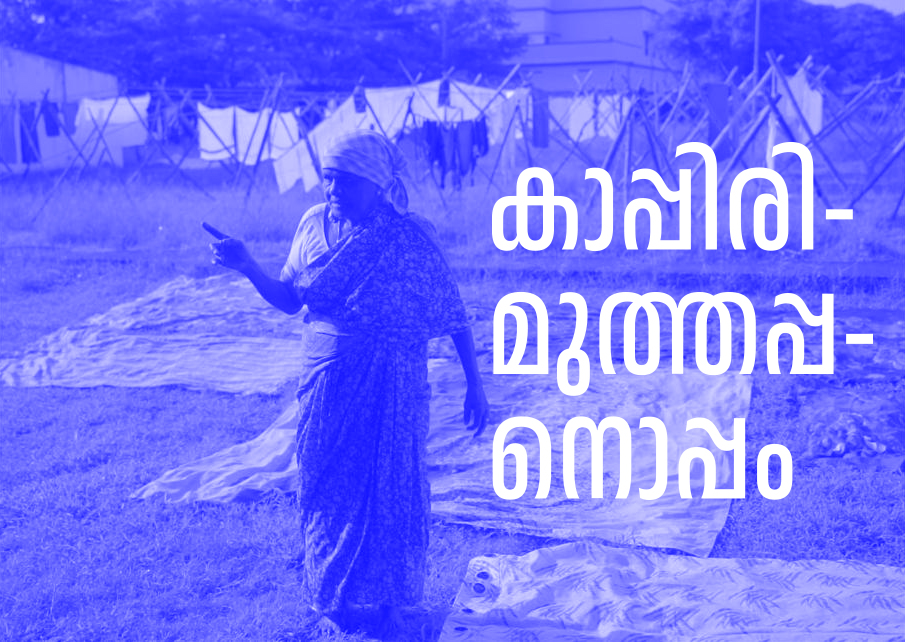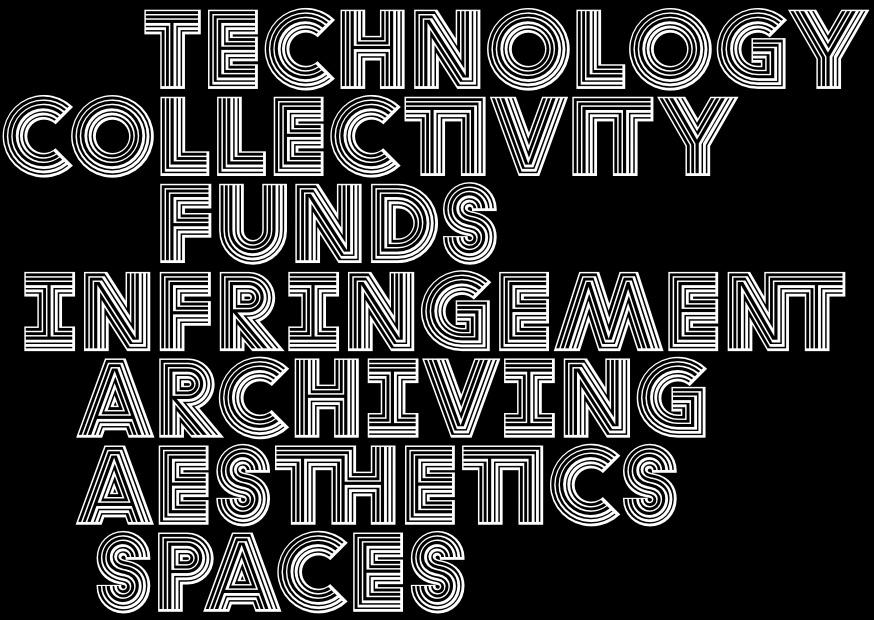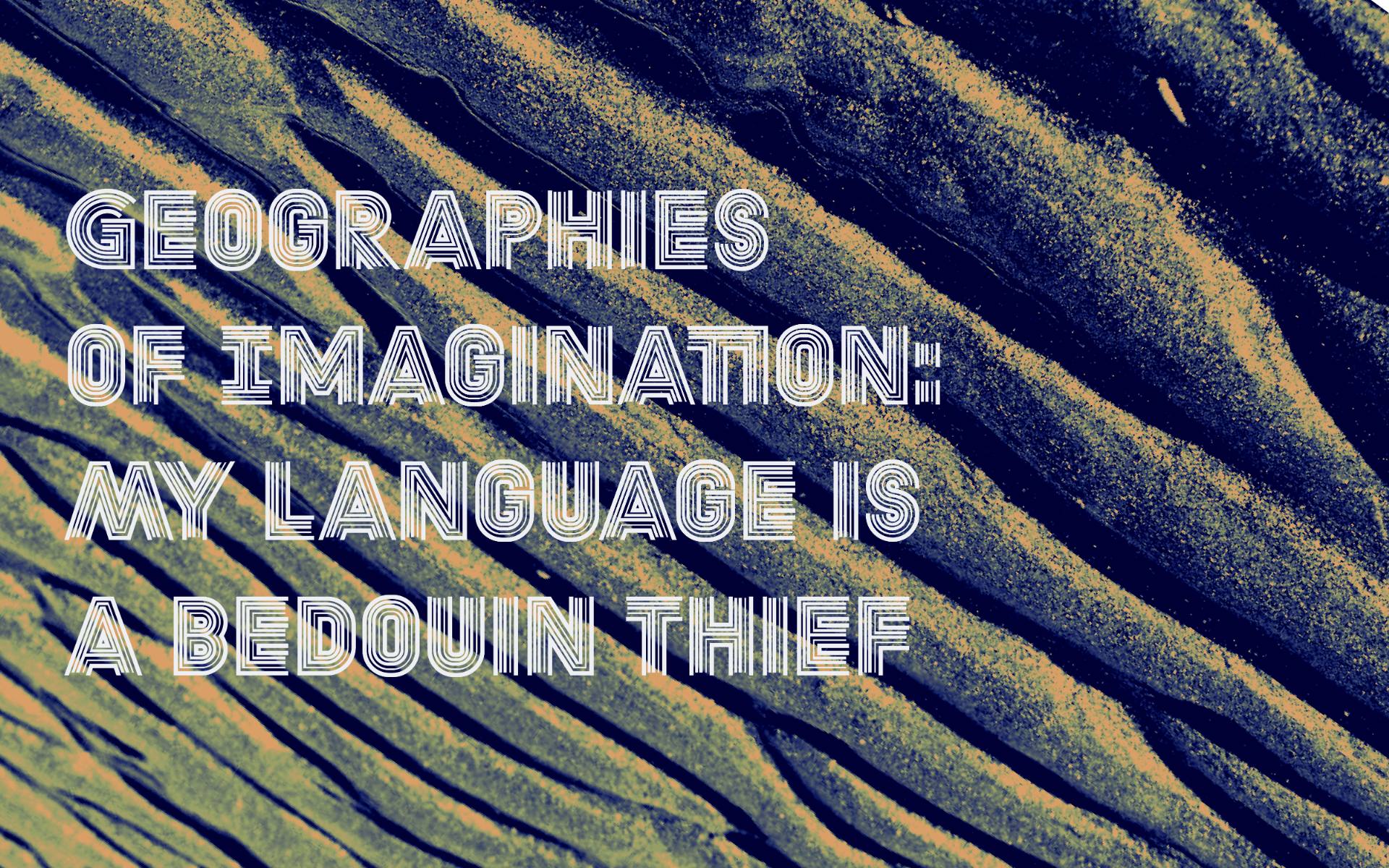IN THE SPIRIT OF KAPPIRI MUTTAPPAN

Ein united screens curriculum
WORKSHOP 09.01.–13.01.2023 10:00–17:00 mit einem daraus entstehendem
FILMPROGRAMM 14.01.–16.01.2023 19:00
KURATION Abhishek Nilamber and Rajesh James
Ort Dhobikhana, Kochi, India
Im Rahmen des Kochi-Muziris Biennale 2022 Invitations Programme
OPEN CALL
The aim of the workshop (09.01.–13.01.2023) is to collectively curate films for public viewing over three subsequent evenings (14.01.–16.01.2023) at Dhobikhana. We invite you to apply if you wish to get hands-on experience with film programming and to work within the context of alternative cinematic expressions, especially from the Global South. Please note that this is not a filmmaking workshop. The workshop is free of charge and encourages applications from persons of all genders, castes, economic and social backgrounds. Interested candidates may apply on or before 24.12.2002. with the subject line “film programming workshop” at workshop@savvy-contemporary.com
PROGRAMME
09.01.2023 | 12:00–17:00 | Fort Creole – Activating the Afromodern spirit With Ananya Jahanara Kabir |
10.01.2023 | 12:00–17:00 | Audio-Visual Representation of Labor, Class and Caste in Malayalam Cinema With Prathap Joseph |
11.01.2023 | 12:00–17:00 | Night School of the People – Cinema as a Tool for Social Pedagogy With Asha Achy Joseph and Jeeva KJ |
12.01.2023 | 12:00–17:00 | Documentary Practice and Labour Struggles With Nicole Wolf and Darshana Sreedhar Mini |
13.01.2023 | 12:00–17:00 | Generating Co-Immunities With Gargi Harithakam |
14.01.–16.01.2023 | 19:00 | Public Film Screenings |
[ മലയാളത്തിന് സ്ക്രോൽ ചെയുക ]
In the framework of our project GEOGRAPHIES OF IMAGINATION within the Kochi Biennial as well as the beginning of an upcoming long term collaboration in Kochi, we cordially invite you to a hands-on film curating workshop at Dhobikhana, Fort Kochi.
We believe that this engaged programme can set the base for people from the community to take agency of their own narrative and bring about a sense of cultural self assertion. Our partners will enable the reverberation of this first step across varied communities in their network and ensure a diverse evolution of the collaboration across various stratas and future possibilities. We invoke with this programme the guiding words of Senegalese filmmaker Sembène Ousman who saw cinema as “l’ecole du soir” or “evening school of the people”. In this sense, we will strive to choose cinema and video art that resonate with solidarity between differing labouring classes and castes in Kochi and beyond.
This multifaceted cinema programme put together with, for and by the members of the community space of Dhobikhana is the beginning of a deeper collaboration which we envision to be an exploration of tools, methods, practices and infrastructures for lateral exchange of art, artists and art making practices on a south-to-south hemisphere.
Located inside the colonial history of Kochi and its attendant imaginaries of oppression and resistance, our cinema program is an attempt to untangle the histories of labour and oppression by revisiting the collective memories of slavery of the Vannan community of Veli, Fort Kochi, predominantly through the myth of Kappiri Muthappan as a means to connect the ongoing experiences of their oppression and resistance with that of the past. The focus of the programme falls on the solidarity between the oppressed classes across time. Thus, Kappiri Muthappan (originally enslaved black people) and their transformation as local deities are evoked as a cultural prototype of solidarity among the oppressed classes.
By being situated inside Dhobikhana, a laundry and community space of the Vannan community who were brought to Kochi as slaves by the Dutch before 300 years, the cinema program engages with three hundred years of colonial and caste oppressions as well as the resilience by this community over the centuries. Foregrounding the politics of the location and by activating the space, the programme listens to and partakes in the intimate stories of oppression, resistance and resilience. Dhobikhana will be conceived more as a cultural chronotope than a labouring space to become a conduit of friendship, of coming together, and a place of identity and memory for the Vannan community.
Dhobikhana is located in the outskirts of Kochi in a place named "Veli", literally meaning periphery which makes it a symbol of exclusive inclusion. As labourers who are in need of cleaning the dirty clothes of the affluent, the washer men/women of Dhobikhana have been living an “untouchable” life since the colonial period. As Dalits of contemporary times, they are even now being confined to a particular space entrusted to deliver their caste-specific roles as “cleaners”, while facing many other social exclusions. Although there is a breakaway from these caste-based occupational demarcations and there is a progressive shift among the younger generation, Dhobikhana still functions as a chronotope of their identity. It is a space that reminds them of their roots which becomes evident in the fact that many “retired government officials'' return to Dhobikhana to do laundry work. What prompts the affluent and the powerful among the community who have worked in white-collar jobs to come back to Dhobikhana as laundry workers? Is this an expression of solidarity among them? Is this homecoming an act of revitalising their collective memory?
The cinema program strives to engage with these questions and personal narratives of the community along with many other concerns through the medium of cinema by conceiving cinema as a means to connect and a medium that promotes solidarity. As the members of the community are concerned that their community and its history are only documented and narrated by people from outside, the cinema program is conceived as a participatory programme in which the members of the community partake in articulating and recording their imaginaries of the past, present and future through the medium of cinema.
One of the legends of solidarity among the labouring oppressed people that inspires us is the legend of Kappiri Muthappan or the grand black grandfather(s), who were enslaved Africans brought to Kochi by the Portuguese to be guards of their wealth. The Kappiris were enslaved guards locked with the looted treasures in dungeons and cellars. As the Portuguese had to escape Kochi hurriedly, with the advancement of the Dutch, they sacrificed the Kappiris in those dungeons and cellars in the belief that their spirits would continue to guard the wealth until they came back. The Portuguese though never came back and over time locals came to worship their spirit, offering the Muthappan cigars, alcohols, eggs, meat etc. as ritualistic offerings even to this day. This transformation of enslaved beings to folk deities can be only explained as an act of deep solidarity and respect between oppressed communities. With the manifestation of the cinema program in Kochi, we attempt to understand and learn from this act of solidarity and respect between oppressed peoples and explore the contemporary perspectives of this history – through cinema.
Curators
Abhishek Nilamber works with projects and products which catalyses democratisation of knowledge. He is a researcher and curator at SAVVY Contemporary, Berlin. Nilamber has been living and working in Berlin since May 2016. His specific interest lies in contemporary cinema cultures active in the Global South, this interest manifests in the form of the research, exhibition and networking project at and beyond SAVVY Contemporary – United Screens. United Screens inquires into the challenges and opportunities in South-to-South circulation of cinema and video art, decoupled from its dependance on both state and capital-based markets. The research takes multiple forms – in the form of an archive of interviews of cinema practitioners from the Global South, as a multiformat exhibition, as an online discursive series called RUSHES and unconference sessions called Think Well.
Rajesh James is a documentary filmmaker and an Assistant Professor in the Department of English, Sacred Heart College, Thevara, Kochi. He is the co-author/editor of books such as India Retold: Dialogues with Independent Documentary Filmmakers in India (Bloomsbury, New York) and Illuminations: Vignettes from Inspirational Literatures (Macmillan Publishers). He was awarded the prestigious Riyad Wadia Award for Best Emerging Filmmaker, India in 2017 and Kerala State Award for Best Documentary in 2020. His documentary Naked Wheels won the K.F.Patil Unity in Diversity Award for Best Documentary Short at Kashish International Queer Film Festival Mumbai in 2017. He was also awarded P.K. Rossy Puraskaram for Best Documentary 2016 by Kerala Sthree Padana Kendram, Government of Kerala at the International Feminist Film Festival of Kerala 2016. His films were nominated for best documentary awards at UK Asian Film Festival 2021 (London), Tasveer: South Asian International Film Festival, Seattle USA, and New York Indian Film Festival in 2018. He has directed documentary films like Slaves of the Empire (2023), In Thunder, Lightning and Rain (2018), Naked Wheels (2017), and Zebra Lines (2014).
കാപ്പിരിമുത്തപ്പനൊപ്പം
കൊച്ചി ബിയന്നാലെയുടെ ഭാഗമായി അഞ്ചു ദിവസത്തെ ചലച്ചിത്ര ആസ്വാദന ക്യാമ്പ് (09.01.-13.01.2023) സംഘടിപ്പിക്കുന്നു. ലോകമെമ്പാടുമുള്ള വിവിധ ചലച്ചിത്ര സംസ്കാരങ്ങളിൽ നിന്ന് പ്രത്യേകിച്ച് ഗ്ലോബൽ സൗത്തിൽ നിന്ന് നിരവധി സിനിമകൾ തിരഞ്ഞെടുത്ത് ദോബിഘാനയിൽ 3 വൈകുന്നേരങ്ങളിൽ (14.01.–16.01.2023) പ്രദർശിപ്പിക്കുക എന്നതാണ് ഇ ക്യാമ്പിന്റെ ലക്ഷ്യം. ലോകമെമ്പാടുമുള്ള അടിച്ചമർത്തപ്പെട്ട തൊഴിലാളി വർഗ്ഗങ്ങൾ തമ്മിലുള്ള പാരസ്പര്യം ഊട്ടിയുറപ്പിക്കുക, അറിയുക, അനുഭവിക്കുക, പറയുക, എഴുതുക എന്നീ ഉദ്ദേശത്തോടെ നിരവധി മേഖലകളിൽ നിന്നുള്ള തൊഴിലാളികളും സിനമാപ്രവർത്തകരും, ചരിത്രകാരന്മാരും, ചരിത്രകാരികളും ഈ ശില്പശാലയിൽ ഒത്തുചേരുന്നു. ഭാവിയിൽ സിനിമകൾ ക്യൂറേറ്റ് ചെയ്യാനും സിനിമാസംസ്കാരങ്ങളിലെ വൈവിധ്യങ്ങളെ തിരിച്ചറിയാനും സംവദിക്കാനും എഴുതാനും താല്പര്യമുള്ളവർ ഈ ഇമെയിൽ വിലാസത്തിലേക്ക് (workshop@savvy-contemporary.com) ‘film programming workshop’ എന്ന മുഖവരയോടെ അപേക്ഷകൾ അയക്കുക. എല്ലാവിധ ലിംഗ/ജാതി/സാമ്പത്തിക/സാമൂഹിക പശ്ചാത്തലമുള്ളവരിൽ നിന്നും അപേക്ഷകൾ പ്രോത്സാഹിപ്പിക്കുന്നു. കൂടാതെ, ശിൽപ്പശാല പൂർണമായും സൗജന്യവുമാണ്.
കൊച്ചിൻ ബിയന്നാലെയുടെ ഭാഗമായ 'ജോഗ്രഫിസ് ഓഫ് ഇമാജിനേഷൻ' എന്ന ഞങ്ങളുടെ ആര്ട്ട് പ്രോജക്ടിന്റെയും, ഭാവിയിൽ കൊച്ചിയിൽ നടത്തപെടാൻ പോകുന്ന മറ്റു കലാപ്രവർത്തനത്തിന്റെയും ഭാഗമായി ഞങ്ങൾ ഫോർട്ട് കൊച്ചിയിലെ ധോബി ഘാനയിൽ നടത്തുന്ന ഹാൻഡ്സ് ഓൺ ഫിലിം ക്യൂറേഷൻ പ്രോഗ്രാമ്മിലേക്കു എല്ലാവരെയും സ്വാഗതം ചെയ്യുന്നു.
പീഡിത വിഭാഗങ്ങളിൽ നിന്നുള്ള ജനങ്ങള്ക്ക് തങ്ങളുടെ സമൂഹത്തിന്റെ ചരിത്രവും, പോരാട്ടവും, സാംസകാരിക അസ്തിത്വവും മുന്നോട്ടു വയ്ക്കാനുള്ള ഒരു വേദിയായി ഇ പ്രോഗ്രാം മാറുമെന്ന് ഞങ്ങൾക്ക് ഉറപ്പുണ്ട്. "ജനങ്ങളുടെ സന്ധ്യാപാഠശാലകളാണ് സിനിമയെന്ന" സെനെഗളിസ് സംവിധായകനായ ഔസ്മാനെ സെംബെനെയുടെ വാക്കുകൾ ഇ പ്രോഗ്രാമിന്റെ മുഖവരയാണ്. ഒസ്മാനയുടെ ഈ ആശയത്തിൽ ഊന്നി കൊച്ചിയിലും മറ്റു സ്ഥലങ്ങളിലുമുള്ള തൊഴിലാളികളും പീഡിതരും ചിതറിക്കപ്പെട്ടവരും തമ്മിലുള്ള പാരസ്പര്യം എന്ന ആശയത്തെ മുൻനിറുത്തിയാവും സിനിമകളും മറ്റു വീഡിയോ ചിത്രങ്ങളും ഇ പ്രോഗ്രാമിൽ പ്രദർശ്ശിപ്പിക്കുക.
തമിഴ്നാടിന്റെ വിവിധ ഭാഗങ്ങളിൽ നിന്നും ഡച്ചുകാർ അലക്കുകാരാക്കി കൊണ്ടുവന്ന വണ്ണാൻ സമൂഹം, ഒരു കാലത്ത് ഫോർട്ട് കൊച്ചിയുടെ പുറമ്പോക്കിൽ അടിമകളായി ജീവിച്ചവരായിരുന്നു. അവരുടെ അധ്വാനത്തിന്റെയും പോരാട്ടത്തിന്റെയും ഭാഗമായി, സമൂഹത്തിലെ ഉച്ചനീചത്വങ്ങളെയും ജാതി ക്രൂരതകളെയും അവർക്ക് അതിജീവിക്കാനായി. കൊച്ചിയിലെ അടിമത്വത്തിന്റെ എക്കാലത്തെയും മാതൃകയായ കാപ്പിരിമുത്തപ്പൻ എന്ന ആഫ്രിക്കൻ അടിമയുടെ മിത്തിലൂന്നി, ഈ സിനിമാ പ്രോഗ്രാം 'അടിമകളാക്കപ്പെട്ട, അടിച്ചമർത്തപ്പെട്ട എല്ലാ സമൂഹങ്ങൾക്കുമൊപ്പം' എന്ന ആശയം മുന്നോട്ടു വയ്ക്കുന്നു.
ഫോർട്ട്കൊച്ചി വെളിയിലെ ധോബി ഘാന എന്ന അലക്കുകേന്ദ്രം ജാതി / ജോലി അടിസ്ഥാനത്തിൽ നിർമിക്കപ്പെട്ട ഒരു സ്ഥാപനം ആണെങ്കിലും, ഇന്ന് അത് ഫോർട്ട് കൊച്ചിയിലെ വണ്ണാൻ സമൂഹത്തിന്റെ അസ്തിത്വത്തിന്റെയും അതിജീവനത്തിന്റെയും ഭാഗമാണ്. പഴയ തലമുറയിലെ ആളുകൾ ആണ് കൂടുതലും ജോലി ചെയ്യുന്നതെങ്കിലും, പുതിയ തലമുറയുടെയും പഴയ തലമുറയുടെയും വേരുകൾ ധോബി ഘാനയുടെ ചരിത്രവുമായി ഇഴചേർന്നു നിൽക്കുന്നു. അതു കൊണ്ട് തന്നെയാണ് നിരവധി വർഷത്തെ സർകാർ ജോലിക്ക് ശേഷം പലരും തിരിച്ച് അലകു ജോലിക്കായി ധോബി ഘാനയിലേക് വരുന്നത്.
വണ്ണാൻ സമൂഹത്തിൻ്റെ ചരിത്രവും, പോരാട്ടവും ആ സമൂഹത്തിലെ അംഗങ്ങൾ എഴുതുകയും, പറയുകയും ചെയ്യുമെന്ന കാഴ്ചപ്പാടിൽ “കാപ്പിരിമുത്തപ്പനോടൊപ്പം” എന്ന ആസ്വാദന/ ആസ്വാദക പ്രോഗ്രാം ഒരു “പങ്കാളിത്ത ഉദ്യമമായാണ്” മുന്നോട്ട് വയ്ക്കുന്നത്. അതുകൊണ്ട് തന്നെ സിനിമ ആസ്വാദനവും, നിരൂപണവും ഈ പ്രോഗ്രാമിൽ ഉണ്ട്. അതിനോടൊപ്പം നിരവധി സിനിമകളുടെ, പ്രത്യേകിച്ച് ‘ഗ്ലോബൽ സൗത്തിൽ’ നിന്നുള്ള സിനിമകളുടെ പ്രദർശനവും, അവലോകങ്ങളും ഉണ്ടായിരിക്കുന്നതാണ്.
UNITED SCREENS is a long-term research, networking, and exhibition project conceived by SAVVY Contemporary intending to create an alliance of community cinema programmers loving independent film and sharing a condition of economic or political fragility. Through this project, we aim to critically examine and reimagine tools, methodologies, value metrics and network logics for community cinema programmers from the South to circulate alternative films and video art across the South. Drawing lessons from the combined spirit of the anti-neocolonial Third Cinema proposition of South America, film cooperatives of South Asia, avant-garde movements of Eastern Europe, as well as decolonial resistances of the African continent, United Screens aspires to be a decentralized, peer-promoted think-well on film culture.
Dieses Projekt ist eine Zusammenarbeit zwischen SAVVY Contemporary und der Kochi-Muziris Biennale 2022. Geefördert von Goethe-Institut / Max Mueller Bhavan, New Delhi, und Goethe Institute Bangalore.


